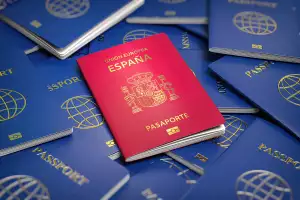
Diana Catalina Caballero Aguirre
LAWYER - FOUNDING PARTNER
- EXPERT IN ADMINISTRATIVE, COMMERCIAL AND FOREIGN LAW
- LAWYER- MANAGER
Latest articles of interest

How to prioritize your family with the single parent card
If having a family implies having great responsibilities, it can be said that, in the case of single-parent families, these responsibilities are doubled. And here we are not only referring to financial responsibilities, but to all the daily efforts made to promote the best conditions and opportunities for children. What many do not know is that having the recognition of the title of large family can be beneficial in several ways and this is what we are going to discuss

ADVANTAGES OF OBTAINING SPANISH NATIONALITY
WHAT ADVANTAGES WILL I HAVE IF I OBTAIN SPANISH NATIONALITY? Welcome back to our blog, today we will be talking about the advantages that you will have if you obtain Spanish nationality. First of all we have to take into account that having Spanish nationality opens the doors of Europe for us and that is, you become not only a Spanish citizen, but also a European citizen. So, you can move to any European country, request your EU certificate and

Constitute a common-law partnership without a notary
Welcome back to our blog, today we will be talking about two ways to establish a common-law relationship without having to go to a notary, but before the registry of stable couples in Catalonia. In our blog last week you can see the way of constituting it before a notary. CONSTITUTE A DOMESTIC PARTNER BEFORE REGISTRATION FOR CONTINUOUS COEXISTENCE FOR TWO YEARS IN A ROW. If you have been living with your partner at the same address for a period

Constituting a common-law couple with a notary
Welcome back to our blog, today we will be talking about one of the ways to establish a domestic partnership that is before a notary. Clearly there are more ways, but this entry will only be directed to the explanation of constituting a common-law couple with a notary. So that they can constitute a common-law couple before a notary, the first thing we are going to do is register the two people who want to make the common-law couple at

How to help my company survive the POST PANDEMIC environment we live in and the race of the digital age
People first. Prior to the PANDEMICthere was talk that we lived together at a business and personal level in enviromentsV.U.C.A Volatility – Uncertainty – Complexity – Ambiguity, however in a pandemic situation and later, the environment has already jumped to the famous B.A.N.I, don’t you know what it is? Well, I’ll tell you quickly so that we can situate ourselves, the environment BANI: Brittle, Brittle – Anxious, Anxious, impatient – Nonlinear, Nonlinear-Incomprehensible, Incomprehensible. It is the acronym that gives characteristics

Why is it important to do the taxes with a professional?
Have you ever wondered why there is such a big price difference when hiring a service to file your income statement. When the time comes to pay your taxes, the most normal thing is that we search Google, Wallapop, Milanuncios or other platforms where services can be offered, the variety in prices is even more curious. How is it possible that for a Can they charge you 20, 30 or 40 euros for the same service? Cheap is expensive. Popular
